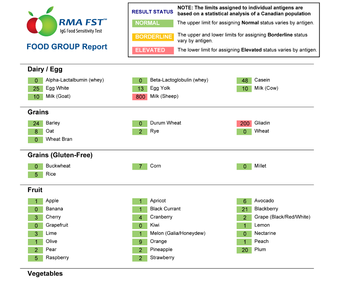Laboratory tests offer us unique insight to how the body is working and points to the areas that need improvement. I will often utilize specialized testing in order to get a clearer picture of your health.
1. IgG Food Sensitivity Test
- This super cool test gives you insight into which foods are aggravating your gut. It measure the degree of immune reaction to commonly consumed foods like milk, eggs, gluten, wheat, corn and sugar. I use this test a lot for people who have bloating, gas, heartburn or constipation; and also for less obvious reasons like acne, anxiety, depression, joint pain and eczema. It's extremely helpful to figure out exactly which foods you need to avoid (often temporarily) in order to reduce inflammation and heal your body. As a side bonus, many people find that eliminating their trigger foods leads to weight loss and less fluid retention.
2. Month Long Hormone Panel
So many women enter my office with concerns of hormonal imbalance. Hormones are messengers that tell our body when to do and when to do it, they keep us in check. When our hormones are "off" (chronic stress, imbalanced diet, liver backlog and lack of exercise being common reasons), we can feel completely dreadful. It can be hard to sleep, women may have irregular, painful or heavy menstrual cycles, it's hard to lose weight, fertility is impacted, or perimenopause is a nightmare.
The trouble with assessing hormones in women is that they cycle and change over the course of the month - they're supposed to - but it makes it difficult to know precisely what's going on if you just take a blood test on any given day. When I want to know more about hormone health, I go to the Month-Long Hormone Panel because this way we get 11 strategic saliva samples so we know exactly what is going on with estrogen, progesterone, DHEA, cortisol and testosterone over the whole month.
3. Comprehensive Stool Analysis (with Parasitology)
I have been extremely impressed with the information from this test because it gives a great picture into digestive health. Not only do we find out which probiotics you need or don't need, we also find out about candida overgrowth, bacterial imbalance, parasite infection, and how well you are digesting fats, carbs and proteins. It also looks for markers of IBS and IBD (Chron's and Colitis). It's a fantastic way to gather more information on the way your body breaks down food, especially when the common solutions aren't helping.
4. Hair Mineral Analysis
This is a great, non-invasive screening tool for your overall health and whether heavy metals are a burden to your system. Using a small hair sample the lab assesses mercury, lead, arsenic, cadmium, magnesium, zinc, selenium, calcium and many other minerals. It also provides significant ratios for these minerals that can also gives clues for stress/adrenal fatigue, bone loss, and thyroid imbalance.
5. Thyroid Function Panel
When you have your thyroid checked by your family doctor, almost always they are simply checking TSH (thyroid stimulating hormone) because it is the accepted screening tool for thyroid function. As you may have already experienced, my standards for TSH are much different than the acceptable norms from the lab because I am looking to optimize your health, not just diagnose disease. Unfortunately, TSH is not the only factor in thyroid health and by only checking TSH we risk missing a thyroid problem. When I run a thyroid panel it's still just a blood test, but it also includes T4 (inactive thyroid hormone), T3 (active thyroid hormone), thyroid antibodies, and reverseT3 (the wrong kind of T3).
Getting a full picture of thyroid health is essential because I don't just care that your thyroid is getting the signal (TSH) to make hormones, I also care that your body is converting the hormone to a usable form (T3). This is why some people don't actually feel better when they take Synthroid or Eltroxin, because their body is not converting the hormone effectively. Their TSH normalizes, but all the symptoms of hypothyroidism (weight gain, constipation, acne, depression, chilly temperature, low energy) remain. I also like to know if the cause of thyroid dysfunction is from an immune response (therefore the reason for checking antibodies), since the most common cause of hypothyroidism is Hashimoto's, an autoimmune disease that requires a different approach to treatment.
6. Organic Acids Test
I like using the OAT urine test to give information on neurotransmitters, some vitamins and minerals, metabolism, yeast overgrowth, and presence of antioxidants. It's great for assessing anxiety and depression so that I know which pathways to support; serotonin, dopamine, or GABA, for example. It's also utilized frequently with autism, ADHD, addictions, neurological disorders, and fatigue.
This is just a snapshot of the wonderful tests we have available to us that you don't get anywhere else. As a Naturopathic Doctor, I also use conventional blood tests frequently. I'd be happy to go over any new test results with you to give you better understanding of what is going on in your body, and what to keep your eye on in the future.
Your in health,
Dr. Christa

 RSS Feed
RSS Feed